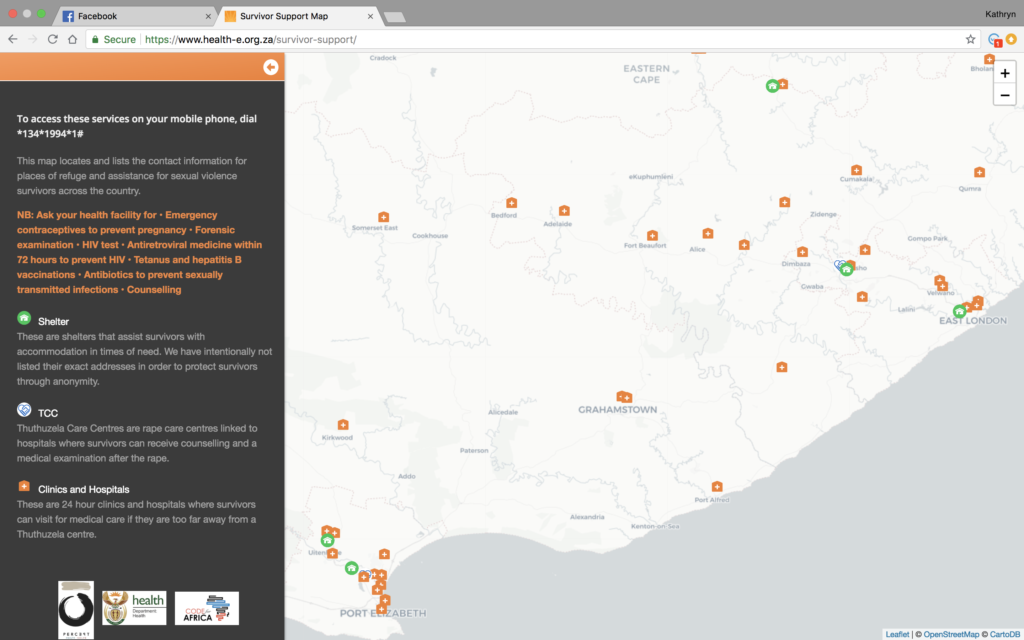As the country continues to mourn the loss of Rhodes University student Khensani Maseko, Grocott’s Mail has made it a priority to provide ongoing coverage of issues related to gender-based violence. The coverage will include news stories, as well as resources for the greater Grahamstown (Makhanda) community.
According to research by Media Monitoring Africa (MMA), out of all stories analysed in South African media in 2017, only 6% were about gender-based violence. The Herald had the most reporting on the topic in the country, more so than Huffington Post and News24. Grocott’s Mail wants to hear your stories, your news, and your questions about gender-based violence so we can continue to investigate and report on this critical national issue.
This week, we have worked to put together a few resources that local residents can easily access if they or someone they know experiences gender-based violence. In July, our colleagues at Health-e News Service launched the Survivor’s Support Service. Kerry Cullinan, Managing Editor of Health-e writes that it is “ a USSD service and online map that provides a directory of all Thuthuzela Care Centres, hospitals, 24-hour clinics and shelters for survivors of sexual violence survivors across the country.”
To access the service, simply dial *134*1994*1#
Users will be shown all the available services in their area, with contact and location details. “This is part of Health-e’s ‘Izwi Lami’ (‘My Voice’) campaign to ensure that rape survivors get the medical services and support that they need and are entitled to.”, writes Cullinan.
Using the service, Grocott’s Mail found that there were only four resources available to survivors within a 50 kilometre radius of Grahamstown (Makhanda). Including Settlers Hospital and Day Hospital.
However, the Makana Rape Survivors Support Group and Safehouse is available for residents. The Support Group and Safehouse are accessible through the South African Police Services (SAPS) Community Service Centre. Should an intake clerk be made aware that a person has experienced gender-based violence, a member of the Support Group will be contacted immediately to further assist and support the person.
The Support Group provides ongoing care and support for survivors of gender-based violence, including initial counselling and personal care. A member of the Support Group will only ask the survivor if they are ready to give a statement to the police, or open a case, once they are ready. The member will also accompany the survivor to the hospital for a medical examination.
Should the survivor and their family be unable to return home, a Safehouse is available. The location of the Safehouse is classified for security purposes.
The Support Group told Grocott’s Mail that they see a high number of survivors, particularly women and young children. They added however that the numbers have decreased in the past year, potentially due to community campaigns. They added that they do not see many students, largely because students do not wish to report their case to the police. In Grahamstown (Makhanda) without reporting the case to the police, survivors are unable to easily access crucial medical services, such as Post-Exposure Prophylaxis (PEPs), and STD/STI screening.
For security reasons, a phone number nor address is available for these services. Residents are pleased asked to visit the Grahamstown or Joza SAPS Community Service Centre.
Grocott’s Mail also spoke to a Senior State Advocate with the National Prosecuting Authority (NPA). They encouraged survivors to come forward and report their cases as soon as possible, the quicker the case is reported, the larger the chance for through investigation and prosecution of the alleged perpetrator. “There is tremendous machinery at our disposal,” they said. In terms of investigating cases of gender-based violence, the NPA along with SAPS are able to successfully collect evidence that could greatly benefit a survivor’s case. They stated that roughly 98 percent of gender-based violence cases are successfully prosecuted in the Grahamstown (Makhanda) High Court. They could not provide information about the Regional Courts.
In the aftermath of Maseko’s death, the Advocate encouraged university students to report their cases to both the institution and the police. They added that the university is not the criminal justice system, and therefore cannot prosecute for rape or sexual assault. Though the alleged perpetrator may be excluded from the institution as a result of an internal investigation, the case must go through the justice system for criminal prosecution.
Grocott’s Mail will continue to report on this issue.
For more information about Health-e’s Survivor Support Services click here: health-e.org.za/…/we-launch-survivors-support-service-to-help-rape-survivors


